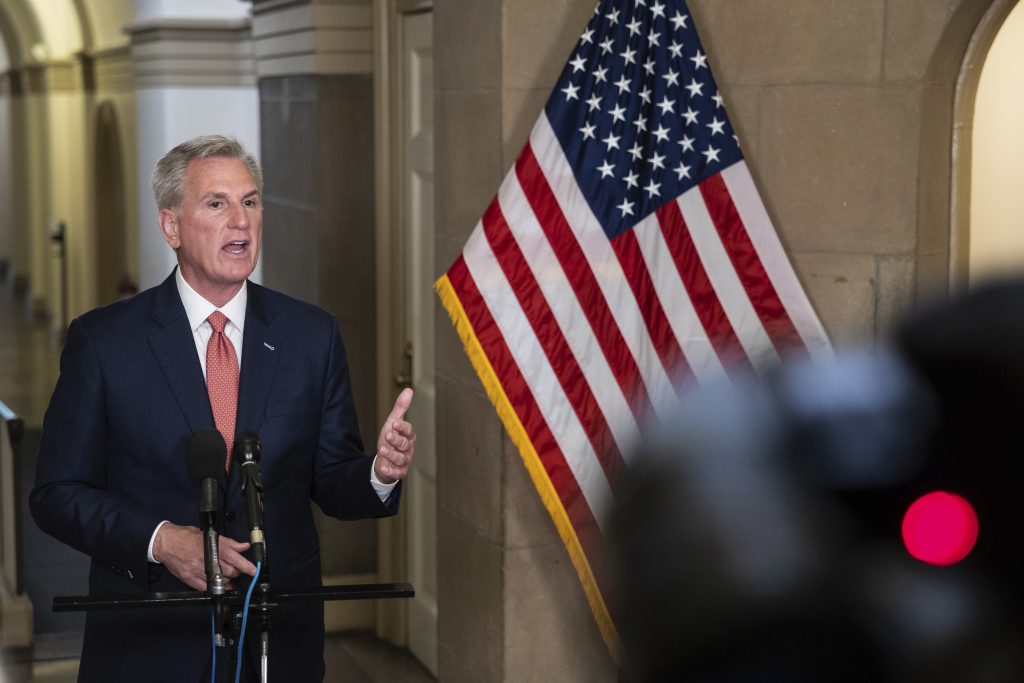Debt ceiling negotiations deteriorated after Republican negotiators rejected a White House offer to limit spending on both defense and a series of domestic programs, two people familiar with negotiations said Saturday.
Republicans instead pushed for increased military spending, which would require deeper cuts to a series of domestic spending programs that the White House has deemed off limits. With the deadline for a potential default less than two weeks away, House Speaker Kevin McCarthy said talks would likely not resume until President Joe Biden returned from Asia late Sunday night.
The impasse came as both sides sharpened their rhetoric, with White House aides abandoning their silence with a fusillade of attacks Saturday accusing the GOP of working in bad faith and threatening the financial stability and credit of the nation.
Biden aides offered what they viewed as a key concession by proposing that Congress hold flat it’s spending on defense, as well as a series of domestic programs including housing aid, education and scientific research. The White House — which earlier this year sought major increases by raising taxes — said that the adjustment would instead amount to a cut because of year-over-year inflation.
But the GOP negotiators rejected the offer, instead insisting on increasing spending for the military, veterans care and border security. To then satisfy the GOP demand to slash overall spending, that would mean the resulting domestic spending cuts would have to increase dramatically to what the White House has deemed “draconian” levels.
Republicans claimed that the White House negotiations — led by top Biden staff while the president is at the G-7 summit in Japan — had changed their offer.
“Unfortunately, the White House moved backwards,” McCarthy told reporters at the Capitol on Saturday. “They actually want to spend more money than we spent this year. We can’t do that. We all know how big this deficit is.”
The White House dismissed the claim and sharpened its attacks on the GOP position. Staff members had largely maintained their silence during negotiations but sent out a series of blistering statements and policy memos Saturday, zeroing in on how McCarthy’s insistence on preserving the Trump-era tax cut skewed toward helping the wealthy and giant corporations would add $3.5 trillion to the debt.
“The Speaker’s team put on the table an offer that was a big step back and contained a set of extreme partisan demands that could never pass both Houses of Congress,” said White House press secretary Karine Jean-Pierre in a statement.
“It is only a Republican leadership beholden to its MAGA wing — not the President or Democratic leadership — who are threatening to put our nation into default for the first time in our history unless extreme partisan demands are met.”
When talks stalled early last week, Biden and McCarthy agreed to empower staff members to deal while the president was overseas. Those talks made some progress for a few days before breaking down Friday.
Over the White House’s objections, McCarthy had insisted that negotiations over the budget be twinned with a vote to raise the nation’s debt ceiling — a move that, most years, is done peacefully and in a bipartisan fashion.
Now that the negotiations appear linked, there is growing worry that an agreement won’t come before the June 1 deadline at which time Treasury Secretary Janet Yellen has said she cannot guarantee that the U.S. government will be able to pay all its bills after that date. A possible default would likely sink the U.S. into a recession and rattle the global economy.
The details of the White House’s latest offer were first reported by The Washington Post.







